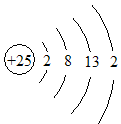(6分)最近,苏泊尔炊具锰超标的问题屡次被曝光,已引起国人普遍关注。锰是一种银白色、硬脆、有光泽的金属。工业上在高温条件下,用铝还原软锰矿(主要成分是MnO2)制得,同时生成氧化铝。锰是正常机体必需的微量元素之一,如果摄入量过多,会造成人体中枢神经系统的伤害,主要表现出精神病的症状,类似于帕金森综合症。
(1)下图是锰原子结构示意图,据图可知锰原子核内质子数为 ,在化学反应中锰原子易 (填“得”或“失”)电子。

(2)正常人每天从食物中需摄入锰3~9毫克。这里的锰指的是 (填“元素”、“原子”、“分子”或“单质”)
(3)写出工业上生产金属锰的化学方程式 。
在该反应中,二氧化锰是 (填“催化剂”、“还原剂”或“氧化剂”)
(1)25(1分);失(1分) (2)元素(1分)
(3)4Al+3MnO2  2Al2O3+3Mn(2分);氧化剂(1分)
2Al2O3+3Mn(2分);氧化剂(1分)
分析:(1)由锰原子结构示意图,可知锰原子中质子数;由最外层电子数可以判断得失电子的情况;
(2)根据从食物中需摄入锰3~9毫克.这里的锰指的是锰元素进行解答;
(3)根据工业上利用铝和二氧化锰反应生成氧化铝和金属锰进行解答.
解答:解:(1)由锰原子结构示意图,可知锰原子中质子数为25;由最外层电子数为2可知在化学反应中锰原子易失去电子;
(2)从食物中需摄入锰3~9毫克.这里的锰指的是锰元素;
(3)工业上利用铝和二氧化锰反应生成氧化铝和金属锰,化学方程式:4Al+3MnO2  2Al2O3+3Mn.该反应中二氧化锰失去氧,为氧化剂.
2Al2O3+3Mn.该反应中二氧化锰失去氧,为氧化剂.
故答案为:(1)25;失;(2)元素;(3)4Al+3MnO2  2Al2O3+3Mn;氧化剂.
2Al2O3+3Mn;氧化剂.
